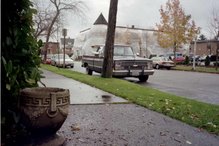Saturday, April 26, 2008
Tuesday, April 22, 2008
"Life in New York," she says over the phone to someone who has mentioned a plane hitting the towers,"Call you tomorrow."
She turns on the tv to see if there is any news report.
"Five tearful hours later..."
Her own personal context and the emergency make her pity herself - she peers into water at a half-dozen bass - the simplicity of their lives seems attractive. "I'm so self-pitying that I envy fish."
........................ Perhaps the book we will read, Not Buying It, evolves from that envy of those fish...................This evening the main Tacoma Reads Together book for 2008 is featured with Vietnam Vets discussing Tim O'Brien's The Things They Carried.
Saturday, April 19, 2008
Saturday Afternoon Television
1. Never use a metaphor, simile, or other figure of speech which you are used to seeing in print.
2. Never use a long word where a short one will do.
3. If it is possible to cut a word out, always cut it out.
4. Never use the passive where you can use the active.
5. Never use a foreign phrase, a scientific word or a jargon word if you can think of an everyday English equivalent.
6. Break any of these rules sooner than say anything outright barbarous.
These rules by George Orwell, who introduced the idea of NewThink, first were written on the University of Washington blackboard for us by Mark Strand. He probably wrote George Orwell and some book reference, because he would write names of writers or books on the board as the class was starting.
The Pennsylvania primary is Tuesday. And newspaper articles even include the word track, racetrack jargon is a part of the election. In a a way this follows Orwell's rules: short words, and these are eveyday English words. But these are also jargon words from the race track glossary.
My Saturday afternoon television choice when I was young was horseraces from the track at Santa Anita. Those were great horses on black and white television. In Pennsylvania, Philadelphia, is American Bandstand -
We're goin' hoppin'
we're goin' hoppin' today
where things are poppin'
out Philadephia way
we're gonna drop in
on all the music they play
on the bandstand.
I saw American Bandstand once or twice.
My mother's family played as a dance band. But there were Lutheran ideas from the old country that discouraged dancing in time of war. However it was, I did not go to dances. When I bought records alone I would choose jazz, like Paul Horn.
Because I took an Amtrak Train from Philadelphia to Chicago via Pittsburg, images for me of Pennsylvania include Amish people plowing with horses and Amish buggies pulled by horses.
At the Western Washington Fairgrounds today there is a Spring Fair. Thoroughbred race horses were the center of the autumn fair when I was young - above a race horse in the stall was a horseshoe of brilliant roses and parts of the silks of the jockeys costumes. Those horses walked along toward the center performance area and the race track. Beautiful from the stands for the race. The beauty level is the same as the present arena features 4-H horses - the horse in the stall is accompanied by organizers who are leaders for the 4-H riders. These are beautiful horses. In the same arena draft horses do a demo (among the drivers are Amish people from Pennsylvania).
This is a deliberate choice about the wholesomeness of the race track - "not a wholesome trottin' race / no, but a race where they set down - right on the horse. And that's trouble..." from The Music Man.
How appropriate is the horse race jargon election language in a present urbane world?
A song I came across recently, sung by Jack Jones, I now remember having listened to on the radio - I am sure I heard "The Race Is On" - This is a really nice song.
Oh, I feel tears welling up from deep inside / like my heart's gonna be break -
And a stab of loneliness, sharp and painful / that I can never shake -
You may say that I'm taking it hard / since you wrote me off of the try,
Don't you wager that I'll hide in sorrow / Cause I might break right down and cry?
This compares to a version by George Jones -
You may say that I'm taking it hard / since you wrote me off of the call -
Don't you wager that I'll hide in sorrow / Cause I might break right down and bawl?
I see the first version avoiding a break - ball (/and pivot joint) reference, a barbarous reference to introduce into the square-dancey song about a horse race.
The word bawl relates back to an Icelandic word - echoic - the sound made by a cow or a calf - in English - a calf bawls. But that might be a rodeo reference.
I think I prefer to not link to one of the YouTube versions of this song here in my blog entry. To me the primary election might be much more like a draft horse demo than a thoroughbred race.
Use video conversation to talk face-to-face with Windows Live Messenger. Get started!

